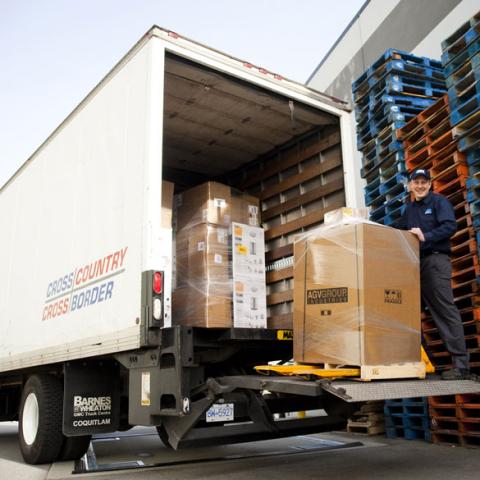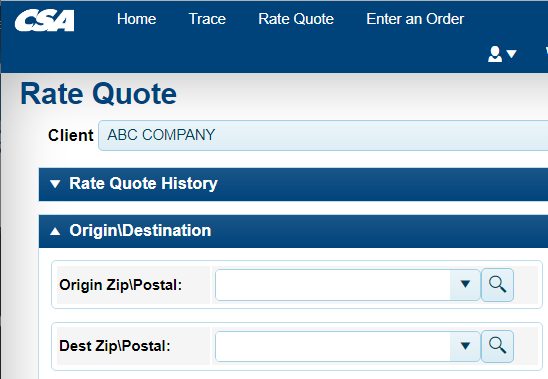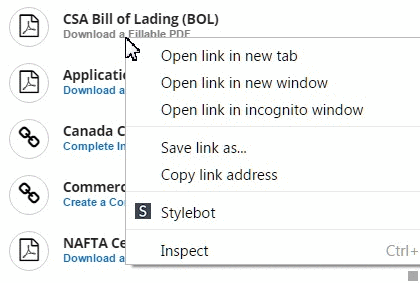Freight Forwarder vs Customs Broker
What is a freight forwarder?
If your business sells goods to a client in another country, for example shipping between U.S. and Canada, you will need the expertise of a freight forwarder. So, what can a freight forwarder do for you and your company? As we said, if you’re selling a product outside of your own country then you know the challenges in getting your product to your end customer. Experienced freight forwarders act as intermediaries between you and your customer, effectively overcoming all the obstacles that they encounter in exporting or importing your goods to that country. They deal with all the transport services, carriers, customs officials and the customer.
Employing the expertise of a freight forwarding company will reduce the level of stress, allowing you to focus on what you do best, and improve your business through a mutually beneficial partnership between your company and your freight forwarder. With the right freight forwarders on board you will have hassle free shipping operations making for happy customers who receive their orders in a timely, streamlined manner. Documentation and liaison with everyone involved in the complex chain from pickup to delivery should be carried out in a professional and efficient way making sure every small detail is checked and assuring undamaged goods and timely delivery.
Here’s a quick overview of what they will do for you:
- Documentation: If you don’t know a Certificate of Origin (COO) from a Bill of Lading (BOL) then your trusted freight forwarder is on hand to help. The have specialist knowledge in all the paperwork necessary and will get through the bureaucratic tangle that is involved in smoothly transferring goods from supplier to customer without you even knowing it is happening. Your freight forwarder will make sure that you have completed all the necessary paperwork before moving your goods. They will help you with complicated and detailed documentation ensuring smooth transition from customs to bank payments which, if not meticulously carried out, could result in delays to delivery.
- Liaisons with a customs broker. By choosing a reputable freight forwarder, who has offices strategically placed for quick and on-time cross-border deliveries, the navigation process of shipping between the USA and Canada will be carried out efficiently and smoothly. If your freight forwarder has distribution centers both in Canada and the USA, and, ideally, near the border, then custom clearance will be quick and seamless. While they are not customs brokers, usually a reputable freight forwarding company will have trained in-house customs coordinators who deal with your broker to ensure smooth transition of goods from one jurisdiction to another.
Most freight forwarders today have direct access to the USA and Canadian custom’s websites. This allows them to access information regarding transport, which can be monitored by them in real-time. Some freight forwarders allow their customers to have personalized access to track shipments, allowing them to keep their client informed on relevant details including delivery times. This type of interaction creates a communication flow between freight forwarders and their client, where documents and details can be cross-checked by each.
What is a customs broker?
As far back as history records show, we know that countries have traded between each other for goods and services. These vital economic transactions are what help a country maintain its economy while having a supply of goods that their people need or want. Given that each country has its own legislation and regulations, products being imported or exported are subject to scrutiny and, where necessary, taxes. Of course, not everything can be imported or exported, some countries have restrictions and it is the responsibility of the customs department of each country to keep control over this. A customs broker is your go-between to allow for the smooth bureaucratic passage of your goods into another country. Customs brokers ensure that your products meet the necessary regulations, that packaging conforms, that labeling is adequate and that taxes, duties and other fees have been paid. They keep up-to-date with changes in regulations and legislation and take care of the intrinsic paperwork.
Your imports/exports broker has the responsibility of recording and keeping all documentation relating to customs movements for five years. These documents must be kept safely and, given their confidential nature, can only be shared with either the customer who the paperwork relates to, or with the customs department who have the authority to inspect or audit documents at any given time.
In order for a customs broker to carry out their work they must have an up-to-date license, issued by US Customs and Border Protection, which is valid in every district in which they carry out their services. Customs brokers who are not in compliance with the law in regard to licenses and permits, will be issued fines.
Customs brokers will also help you with:
- Classification of goods – the very complex tariff system used in the USA is often too complicated for suppliers who use the knowledge of their customs broker to keep them up-to-date with the HTSUS – Harmonized Tariff System of the US.
- Customs Bonds
- Duty Drawback
- Reconciliation
- Importer Security Filings (ISF)
Freight Forwarder vs Customs Broker – what are the differences?
If your company is involved in shipping goods to and/or from USA/Canada then two of your most important partners, and closest allies, will be a freight forwarder and customs broker. Independent of each other because of the differences in their work and responsibilities you will need to have a close working partnership with both of them to enable your cross-country commerce to flourish.
The main difference between the two is that the freight forwarder deals with the logistics of actually moving your goods from A to B – the physical transport of the goods, warehousing and storing. The customs broker, on the other hand, deals with the bureaucratic side, document completion, of getting your goods into (or out of) a country.
Your custom broker has direct contact with various government agencies, including the Department of Agriculture, Consumer Product Safety Commission, FDA and of course the U.S. Customs Border and Protection. They deal with many agencies on a weekly basis and having them working for you means easy communication with the various official offices.








